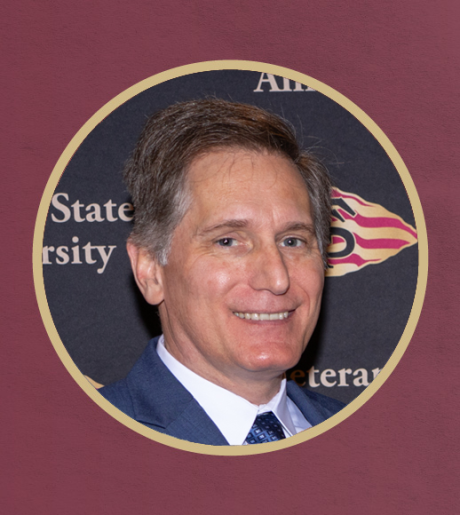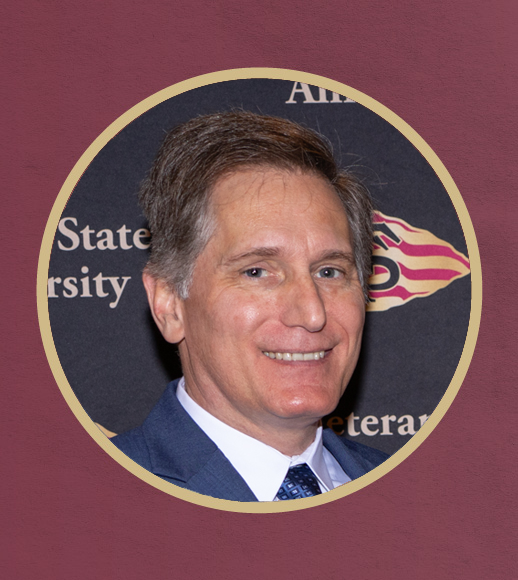Kozel-led team lands $1.44 million DoD grant to advance brain stimulation technology for PTSD


FSU Neuromodulation, led by F. Andrew Kozel, M.D., of the Florida State University College of Medicine, in collaboration with the FSU College of Nursing, was awarded a $1.44 million, three-year grant from the U.S. Department of Defense to further research in transcranial magnetic stimulation (TMS) treatments for neuropsychiatric disorders.
TMS is a medical procedure that uses magnetic fields to stimulate nerve cells in the brain. An electromagnetic coil is placed against the scalp and creates magnetic pulses that reach the brain surface. Its use has been approved by the U.S. Food and Drug Administration for treatment-resistant depression, obsessive compulsive disorder, anxious depression, migraines and to assist with smoking cessation. Kozel said it is rapidly expanding as a treatment option for veterans receiving care from the Veterans Administration. It is considered “non-invasive” because it does not require surgery or cutting of the skin.
“Depression and Post-Traumatic Stress Disorder (PTSD) share some overlapping symptoms and patients often suffer from both conditions,” said Kozel, director of the FSU Neuromodulation Lab and the Mina Jo Powell Endowed Chair in Neurological Sciences at the college.
“TMS is a promising potential therapy for PTSD, and the technology developed in this project will help advance research and clinical practice for PTSD, depression and other brain-based disorders,” he said.
The purpose of this study is to improve the personalization of the TMS treatment, to significantly improve clinical outcomes.
Retired Air Force Col. William “Billy” Francis, an FSU alumnus and director of the university’s Student Veterans Center since its inception in 2011, played a key role in securing the grant. “His support and willingness to collaborate with our lab was a critical element in our ability to compete for these highly competitive DoD grants,” Kozel said.
Francis, who spent 26 years as a jet fighter pilot, said he is thankful for the support veterans are given at FSU and the university-wide commitment to their success.
“I believe we have a responsibility to our veterans, to walk with them on their journey from the military into their post-service lives,” Francis said. “Dr. Andy Kozel and the FSU community are exploring therapies to give those with challenges, related to trauma, tools to use as options along the way toward their goals and dreams.
“Weaving our veterans back into the fabric of our society is our responsibility. I am thankful for this work and for the commitment FSU has made in actions like this.”
The Kozel Lab project seeks to personalize the proper dose, or strength of the magnetic pulses, for each patient. Differences in anatomy and function, such as skull thickness and brain activity levels, mean that one dose does not fit all. If the dose is too weak, no therapeutic effect will be generated in the brain. If the dose is too strong, the patient will have an increased risk for a seizure.
This study builds on research by Kozel and colleague Kevin A. Johnson, Ph.D., R.N., who is co-director of the FSU Neuromodulation Lab and a research faculty member in the College of Medicine’s Department of Behavioral Sciences and Social Medicine (BSSM).
“Over 20 years ago, we looked at adjusting the dose parameters related to age based on MRI scans, which was important to the successful development of this technology early on,” Kozel said. “Based on our prior success, we think that if we enhance the personalization for each individual, we will improve clinical outcomes, and that is the point.”

In addition to Kozel and Johnson, other members of the FSU Neuromodulation team working on this study are Project Manager Isabelle Taylor, M.A., Research Assistant Megan Senda, B.S., and Medical Assistant Mariah Jensen. The FSU College of Nursing team includes Professor Hongyu Miao, Ph.D., and Graduate Research Assistant Heling Tong.
Currently, TMS dosing of the intensity of treatment is indirect. As Kozel explained, first you place the TMS coil over the motor cortex, the part of the brain that moves the fingers, and you figure out how much energy it takes to move the fingers 50% of the time. The TMS coil is subsequently moved to a different location on the brain for the treatment. Typically, for depression and other neuropsychiatric disorders, the area stimulated is the front of the brain called the prefrontal cortex.
“Because there are no observable signals as to what is actually happening when stimulating the prefrontal cortex, you are forced to rely on the dose intensity determined for the motor cortex,” Kozel said.
The technology the team is developing and submitted for a patent will allow researchers to measure what is happening in the prefrontal cortex directly, using TMS with functional near infrared spectroscopy (fNIRS). Because the fNIRS technology uses the light spectrum to measure brain function, it does not interact with the powerful electromagnetic energy created by the TMS pulses. This lack of interaction is important for safety and for accurate measurement of the dose for each patient. Volunteers suffering from PTSD, as well as those with mild to moderate traumatic brain injuries (TBI), will be enrolled in this study.
Kozel credits Brent Edington, Ph.D., a senior licensing manager in FSU’s Office of Commercialization, for helping get the patent application submitted.
“Cutting edge clinical research requires many moving parts to function efficiently and effectively together in order to be successful,” Kozel said. “We are demonstrating that Florida State University has the potential to compete for highly competitive grants and produce research findings that can have a profound impact on the clinical care of patients suffering from devastating neuropsychiatric disorders.”

